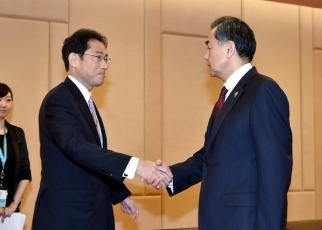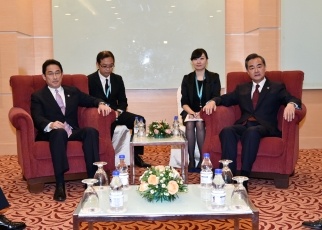Japan-China Relations
Japan-China Foreign Ministers' Meeting
August 7, 2015


On Thursday, August 6, commencing at around 2:30 p.m. (local time) for approximately one hour, Mr. Fumio Kishida, Minister for Foreign Affairs, who is visiting Kuala Lumpur, Malaysia, to attend the Association of Southeast Asian Nations (ASEAN)-related Foreign Ministers’ Meetings, held a Japan-China Foreign Ministers’ Meeting with Mr. Wang Yi, Foreign Minister of the People’s Republic of China. The overview of the meeting is as follows.
- 1. General remarks on Japan-China relations
- 2. The development of natural resources in the East China Sea
- 3. The situation in the South China Sea
- 4. Recognition of history
- 5. Japan's legislation for peace and security
1. General remarks on Japan-China relations
- (1) Minister Kishida noted that this was the fifth meeting with Minister Wang since their first meeting in Naypyidaw a year ago, and over that period, with two summit meetings, the relationship between Japan and China turned to a positive direction. Minister Kishida stated that he hoped to cooperate with Minister Wang to achieve further improvement of the Japan-China relationship.
- (2) Minister Kishida expressed the view that although the Japan-China relationship was improving, a sense of mistrust remained mutually, including in the security field. He stated that there seemed to be skeptical views in China about some developments in Japan, but there was no change in Japan’s basic policy on China, which was to attach great importance to the four basic documents between the two countries and to develop the relationship based on the concept of “Mutually Beneficial Relationship based on Common Strategic Interests”. Minister Kishida stressed the importance for both sides to refrain from resorting to unilateral actions and build up dialogues and thereby restoring mutual trust. He stated that Japan would make such efforts and expect China do the same, and in particular it was important for the governments of the two countries to make positive comments wherever possible.
- (3) In response, Minister Wang expressed his appreciation for Minister Kishida’s positive remarks.
- (4) After the following exchanges, the two ministers agreed on the necessity to continue consultations at various levels on issues between Japan and China, including the issue of the development of natural resources in the East China Sea.
2. The development of natural resources in the East China Sea
- (1) With regard to the issue of the development of natural resources in the East China Sea, Minister Kishida noted the existence of the “June 2008 Agreement,” and requested the Chinese side to stop its unilateral development activities, and promptly come back to the dialogue table, with a view to restarting negotiations for the implementation of the “June 2008 Agreement.” Minister Kishida stated that the two countries should unconditionally continue dialogue toward restarting negotiations for the implementation of the agreementy.
- (2) Minister Wang responded by reiterating China’s unique position concerning the interpretation of the “June 2008 Agreement.”
- (3) In response, Minister Kishida once again firmly explained Japan’s position on this issue, and expressed the view that there were some differences in the two sides’ interpretations of the “June 2008 Agreement,” and that these differences were the very reason why it was important that the two parties talked to each other, and he hoped to continue such dialogues.
3. The situation in the South China Sea
- (1) As Minister Wang expressed the view that Japan should stop deliberately criticizing China with regard to the situation in the South China Sea and other issues, Minister Kishida explained that it was a complete misunderstanding that Japan was deliberately criticizing China, and that he had rather stated repeatedly that China’s peaceful development represented an opportunity. On the other hand, Minister Kishida continued, where the situation in the South China Sea was concerned, the international community would never accept unilateral attempts to change the status quo, or claims and actions not based on international law. Minister Kishida explained that this was a general principle to which Japan adhered, and not what Japan was saying about China alone.
- (2) In response, Minister Wang once again expressed views based on China’s existing position on the situation in the South China Sea.
4. Recognition of history
- (1) Minister Wang stated that China hoped Japan would squarely face history with a responsible attitude, and he explained China’s position on the issue of the recognition of history including the statement on the 70th anniversary of the end of World War II.
- (2) In response, Minister Kishida stated that the content of the Prime Minister’s statement would ultimately be decided by Prime Minister Shinzo Abe himself, and the Prime Minister had reiterated that Japan’s sense of remorse over the past war and its path as a peace-loving nation since the end of World War II would never change in the future. Then, Minister Kishida once again explained the Abe Cabinet’s basic position on the recognition of history.
5. Japan's legislation for peace and security
- (1) Minister Wang stated that China was paying attention to the debate on the legislation for peace and security, in connection with the direction of national development of Japan.
- (2) In response, Minister Kishida explained that the legislation for peace and security would not change Japan’s basic security policy such as being a peace-loving nation and maintaining an exclusively defense-oriented policy, and that Japan would nevertheless continue to be accountable and provide other countries with careful explanations.

